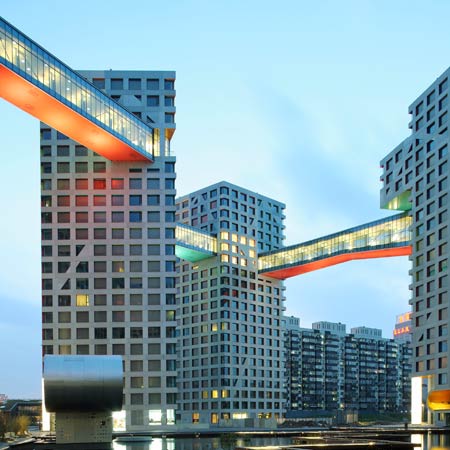
Linked Hybrid by Steven Holl Architects
Steven Holl Architects have completed Linked Hybrid, a mixed-use complex of eight linked towers in Beijing, China.
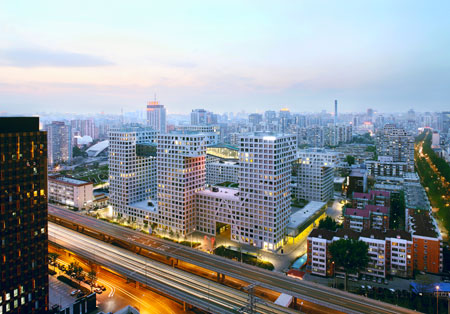
The project, which was last week named Best Tall Building 2009 in the Asia and Australia category by the Council on Tall Buildings and Urban Habitat, comprises apartments, a hotel, cinema, kindergarten, school, underground car park, commercial zones and a public green space.
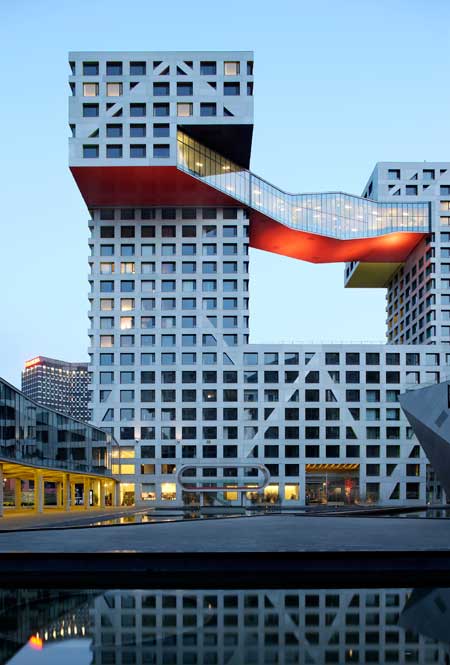
A series of multi-functional "skybridges" connect the eight residential towers and the hotel tower.
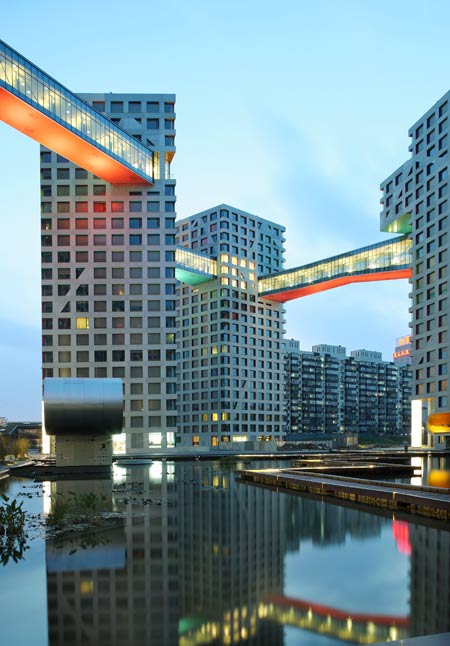
The architects are aiming to achieve LEED Gold Certification, making Linked Hybrid one of the largest green residential projects.
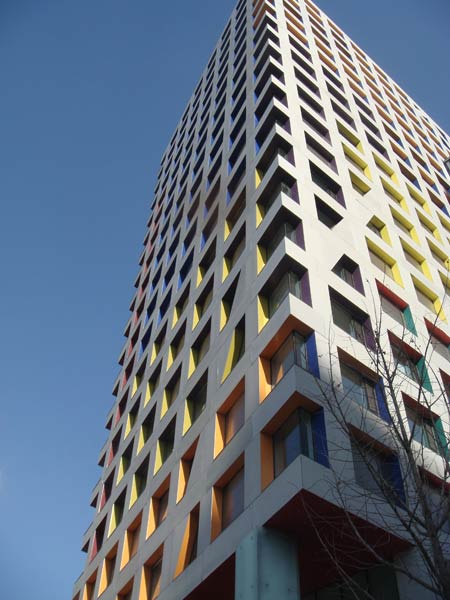
Geothermal wells 100m below the foundations provide heating in the winter and aid cooling during the summer.
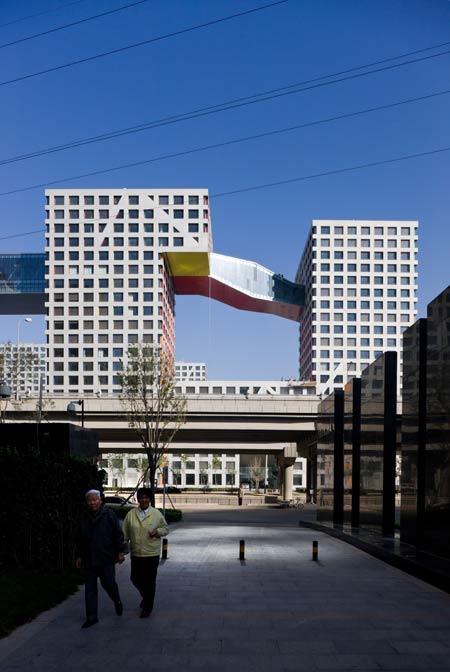
A pond in the centre of the complex holds recycled greywater from the buildings and will freeze over in the winter, transforming into a public ice rink. Above photograph by Iwan Baan.
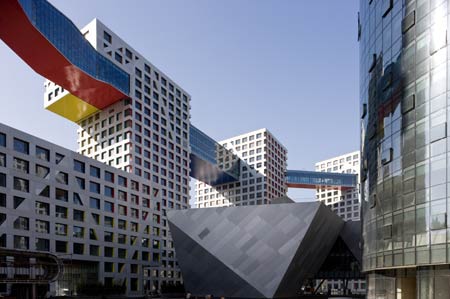
The earth excavated during the construction of the project has been landscaped to create a series of mounds housing public recreational areas. Above photograph by Iwan Baan.
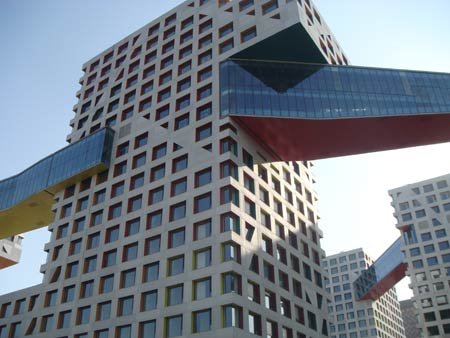
See our previous story for construction images. All images here are courtesy of Steven Holl Architects unless otherwise stated.
More Dezeen stories about Steven Holl Architects:
Shenzhen 4 Tower in 1
The LM Project, Copenhagen
Franz Kafka Society Center, Prague
Porosity Bench
Construction of Linked Hybrid, Beijing
Sliced Porosity Block, Chengdu
Hudson Yards masterplan, New York
NYU Department of Philosophy, New York
Nelson-Atkins Museum, Kansas City
Knut Hamsun Center, Norway
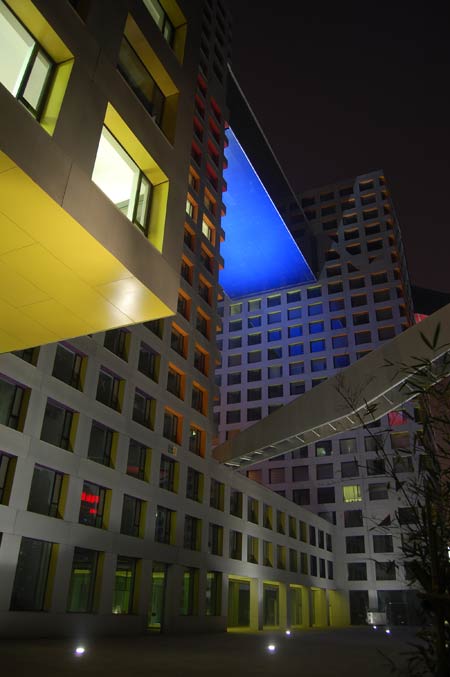
Here are the details from Steven Holl Architects:
--
Linked Hybrid
Beijing, , China
2003 – 2009
PROJECT TEXT
The 220,000 square-meter Linked Hybrid complex in Beijing, aims to counter the current urban developments in China by creating a twenty-first century porous urban space, inviting and open to the public from every side. A filmic urban experience of space; around, over and through multifaceted spatial layers, as well as the many passages through the project, make the Linked Hybrid an “open city within a city”. The project promotes interactive relations and encourages encounters in the public spaces that vary from commercial, residential, and educational to recreational; a three-dimensional public urban space.
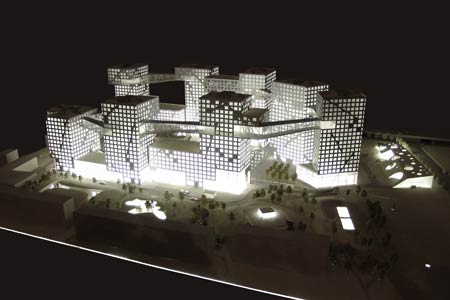
The ground level offers a number of open passages for all people (residents and visitors) to walk through. These passages include “micro-urbanisms” of small scale shops which also activate the urban space surrounding the large central reflecting pond. On the intermediate level of the lower buildings, public roof gardens offer tranquil green spaces, and at the top of the eight residential towers private roof gardens are connected to the penthouses. All public functions on the ground level, - including a restaurant, hotel, Montessori school, kindergarten, and cinema - have connections with the green spaces surrounding and penetrating the project.
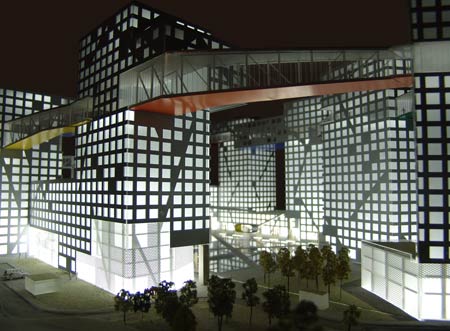
Elevators displace like a “jump cut” to another series of passages on higher levels. From the 18th floor a multi-functional series of skybridges with a swimming pool, a fitness room, a café, a gallery, etcetera connects the eight residential towers and the hotel tower, and offers views over the unfolding city. Programmatically this loop aspires to be semilattice-like rather than simplistically linear. We hope the public sky-loop and the base-loop will constantly generate random relationships; functioning as social condensers in a special experience of city life to both residents and visitors.
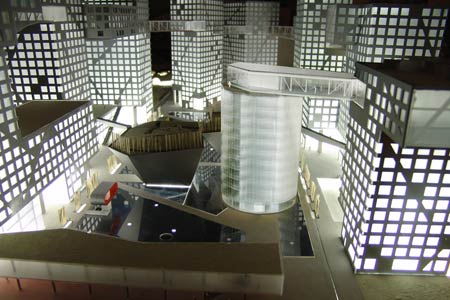
Focused on the experience of passage of the body through space, the towers are organized to take movement, timing and sequence into consideration. The point of view changes with a slight ramp up, a slow right turn. The encircled towers express a collective aspiration; rather than towers as isolated objects or private islands in an increasingly privatized city, our hope is for new “Z” dimension urban sectors that aspire to individuation in urban living while shaping public space.
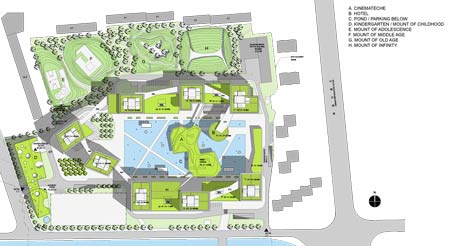
Geo-thermal wells (660 at 100 meters deep) provide Linked Hybrid with cooling in summer and heating in winter, and make Linked Hybrid one of the largest green residential projects. The large urban space in the center of the project is activated by a greywater recycling pond with water lilies and grasses in which the cinematheque and the hotel appear to float. In the winter the pool freezes to become an ice-skating rink.
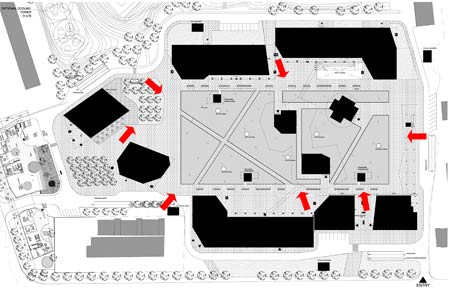
The cinematheque is not only a gathering venue but also a visual focus to the area. The cinematheque architecture floats on its reflection in the shallow pond, and projections on its facades indicate films playing within.
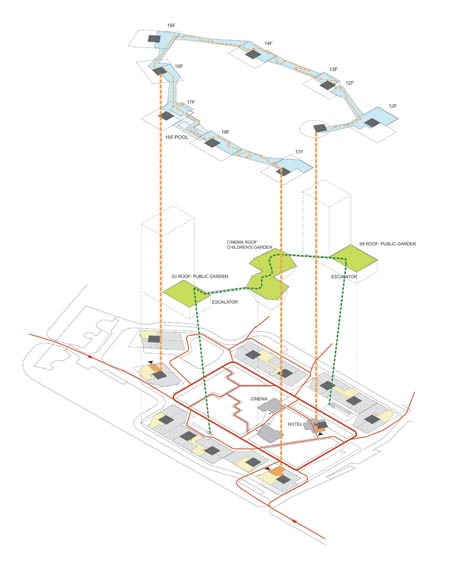
The first floor of the building, with views over the landscape, is left open to the community. The polychrome of Chinese Buddhist architecture inspires a chromatic dimension. The undersides of the bridges and cantilevered portions are colored membranes that glow with projected nightlight and the window jambs have been colored by chance operations based on the ‘Book of Changes’ with colors found in ancient temples.
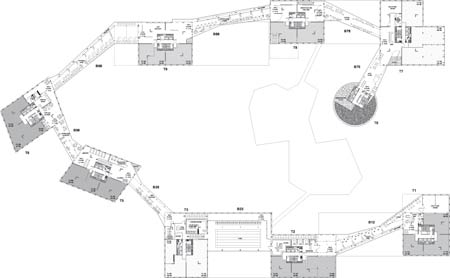
The water in the whole project is recycled. This greywater is piped into tanks with ultraviolet filters, and then put back into the large reflecting pond and used to water the landscapes. Re-using the earth excavated from the new construction, five landscaped mounds to the north contain recreational functions. The ‘Mound of Childhood’, integrated with the kindergarten, has an entrance portal through it. The ‘Mound of Adolescence’ holds a basketball court, a roller blade and skate board area. In the ‘Mound of Middle Age’ we find a coffee and tea house (open to all), a Tai Chi platform, and two tennis courts. The ‘Mound of Old Age’ is occupied with a wine tasting bar and the‘Mound of Infinity’ is carved into a meditation space with circular openings referring to infinite galaxies.

GREEN SHEET
sustainable design intent
Linked Hybrid’s intended experience of spatiality and passage has a tremendous impact on its sustainability.Envisioned as an “open city within a city”, it is a pedestrian-oriented combination of public and private space that encourages the use of shared resources and reduces the need for wasteful modes of transit. It is an urban oasis, proving that peaceful, green spaces can exist in an exploding metropolis such as Beijing. This project aims to attain LEED Gold Certification.
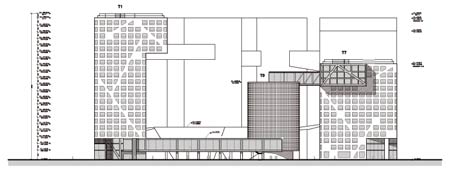
water efficiency
An estimated 220,000 liters of gray water from all apartment units will be recycled each day and reused for landscape and green roof irrigation, toilet flushing, and rebalancing pond water—resulting in a 41% decrease in potable water usage.
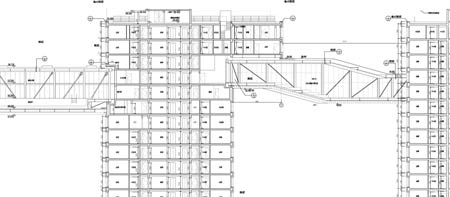
energy flows
Linked Hybrid’s ground source heat pump system, one of the largest in residential construction, is its most groundbreaking innovation. Shouldering 70% of the complex’s yearly heating and cooling load, the system is comprised of 660 geothermal wells, 100 meters below the basement foundation. Additionally, the underground wells have taken the place of above-ground space normally needed for cooling towers, increasing available green areas, minimizing noise pollution and significantly reducing the CO2 emissions created by traditional heating/cooling methods.
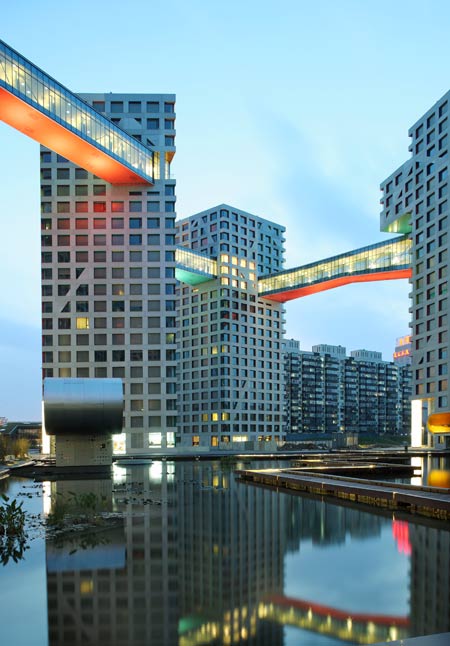
high performance building systems
The project boasts exterior window louvers and low-e coated glass for solar gain and heat control, as well as a high-performance building envelope and integrated slab heating and cooling system.
indoor environmental quality
Linked Hybrid makes use of a technique called displacement ventilation, in which air that is slightly below desired temperature in a room is released from the floor. The cooler air displaces the warmer air, causing it to be released from the room and resulting in a cooler overall space and a fresh breathing environment.
FACT SHEET
Program: 750 apartments, public green space, commercial zones, hotel, cinemateque, kindergarten, Montessori school, underground parking.
Floor area: (square) 2383797sf/221462sm
Floor area: (square) above 1753775sf/162931sm
Floor area: (square) below 629635sf/58495sm
Building area (square) 2368060sf/220000sm
General Contractor: Beijing Construction Engineering Group
Client: Modern Green Development Co., Ltd. Beijing
Architect: Steven Holl Architects
Steven Holl, Li Hu (design architect)
Li Hu (partner in charge)
Hideki Hirahara (project architect)
Yenling Chen (assistant project architect)
Chris McVoy, Tim Bade (technical advisor)
Garrick Ambrose, Yimei Chan, Rodolfo Dias, Gong Dong, Peter
Englaender, Guido Guscianna, Young Jang, Edward Lalonde,
JongSeo Lee, Richard Liu, James MacGillivray, Matthew
Uselman (project designer)
Jason Anderson, Lei Bao, Christian Beerli, Johnna Brazier,
Cosimo Caggiula, Kefei Cai, Guanlan Cao, Shih-I Chow, Sofie
Holm Christensen, Frank-Olivier Cottier, Christiane Deptolla,
Mike Fung, M. Emran Hossain, Gyoung-Nam Kwon, Eric Li, Tz-Li
Lin, Clark Manning, Maki Matsubayashi, Giorgos Mitroulias,
Daijiro Nakayama, Olaf Schmidt, Judith Tse, Li Wang, Ariane
Wiegner, Lan Wu, Noah Yaffe, Liang Zhao (project team)
Associate Architects: Beijing Capital Engineering Architecture Design Co. LTD
Structural Engineer: Guy Nordenson and Associates; China Academy of Building Research
Mechanical Engineer: Transsolar; Beijing Capital Engineering Architecture Design Co. LTD; Cosentini Associates
Lighting Consultant: L'Observatoire International
Curtain Wall Consultant: Front Inc.; Xi’an Aircraft Industry Company LTD; Yuanda Curtain-wall; Jianghe
Landscape Architect: Steven Holl Architects; EDAW Beijing; TSLD
Interior Designer: Steven Holl Architects; China National Decoration Co., LTD